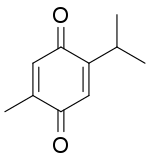Thymoquinone
 | |
| Names | |
|---|---|
| Preferred IUPAC name
2-Methyl-5-(propan-2-yl)cyclohexa-2,5-diene-1,4-dione | |
| Other names
Thymoquinone | |
| Identifiers | |
CAS Number |
|
3D model (JSmol) |
|
| ChEBI | |
| ChEMBL | |
| ChemSpider | |
| ECHA InfoCard | 100.007.020 |
PubChem CID |
|
| UNII | |
CompTox Dashboard (EPA) |
|
InChI
| |
SMILES
| |
| Properties | |
Chemical formula |
C10H12O2 |
| Molar mass | 164.204 g·mol−1 |
Except where otherwise noted, data are given for materials in their standard state (at 25 °C [77 °F], 100 kPa). | |
| Infobox references | |
Thymoquinone is a phytochemical compound found in the plant Nigella sativa. It is also found in select cultivated Monarda fistulosa plants which can be steam distilled to produce an essential oil.
It has been classified as a pan-assay interference compound, which binds indiscriminately to many proteins.[1] It is under preliminary research to identify its possible biological properties.[2][3][4]
See also
- Dithymoquinone, a dimer of thymoquinone
- 2,5-Dimethoxy-p-cymene
References
- ↑ Baell JB (March 2016). "Feeling Nature's PAINS: Natural Products, Natural Product Drugs, and Pan Assay Interference Compounds (PAINS)". Journal of Natural Products. 79 (3): 616–28. doi:10.1021/acs.jnatprod.5b00947. PMID 26900761.
- ↑ Farkhondeh T, Samarghandian S, Borji A (September 2017). "An overview on cardioprotective and anti-diabetic effects of thymoquinone". Asian Pacific Journal of Tropical Medicine. 10 (9): 849–854. doi:10.1016/j.apjtm.2017.08.020. PMID 29080612.
- ↑ Leong, Xin-Fang; Choy, Ker Woon; Alias, Aspalilah (2021-12-15). "Anti-Inflammatory Effects of Thymoquinone in Atherosclerosis: A Mini Review". Frontiers in Pharmacology. 12: 758929. doi:10.3389/fphar.2021.758929. ISSN 1663-9812. PMC 8715035. PMID 34975474.
- ↑ Ali, Md Yousuf; Akter, Zakia; Mei, Zhiqiang; Zheng, Meiling; Tania, Mousumi; Khan, Md Asaduzzaman (February 2021). "Thymoquinone in autoimmune diseases: Therapeutic potential and molecular mechanisms". Biomedicine & Pharmacotherapy. 134: 111157. doi:10.1016/j.biopha.2020.111157. ISSN 1950-6007. PMID 33370631. S2CID 229714190.
This article is issued from Offline. The text is licensed under Creative Commons - Attribution - Sharealike. Additional terms may apply for the media files.